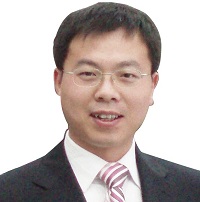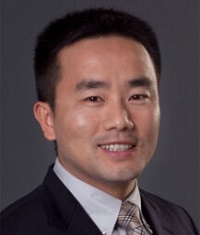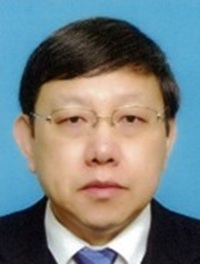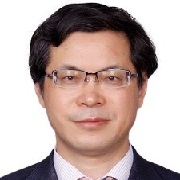Keynote Speakers-REPE 2025

Prof. Wei Xu , Chinese Academy of Sciences, China
Wei Xu (IEEE Fellow) received the double B.E. and M.E. degrees from Tianjin University, Tianjin, China, in 2002 and 2005, and the Ph.D. from the Institute of Electrical Engineering, Chinese Academy of Sciences (IEECAS), in 2008, respectively, all in electrical engineering. His research topics mainly focus on design and control for linear machines and drives. From 2008 to 2012, he made Postdoctoral Fellow with University of Technology Sydney, Vice Chancellor Research Fellow with Royal Melbourne Institute of Technology, Japan Science Promotion Society Invitation Fellow with Meiji University, respectively. From Oct. 2013 to Dec. 2023, he was one Professor with Huazhong University of Science and Technology, China. Since Jan. 2024, he has been one professor with IEECAS and Director for Key Laboratory of High Density Electromagnetic Power and Systems (Chinese Academy of Sciences). He is IEEE Fellow and IET Fellow. He is the General Chair for 2021 International Symposium on Linear Drives for Industry Applications (LDIA 2021) and 2023 IEEE International Conference on Predictive Control of Electrical Drives and Power Electronics (PRECEDE 2023). He has been Associate/Editor for over ten peer-reviewed IEEE journals, including IEEE Transactions on Industrial Electronics, IEEE Transactions on Power Electronics, and so on. He has authored/edited 12 books, published over 180 IEEE journal papers, been granted over 150 invention patents in the related field of LMs and drives, which has been cited by over 11,000 times with H-index 51 based on Google Scholar till December 2024.
Speech Title: Efficiency Improvement Strategies on Linear Induction Machines and Drive Systems for Transportation
Abstract: The speech aims to share some most recent advancements in control strategies how to increase the working efficiency on linear induction machines and drive systems, particularly adopted to linear metro, medium-low speed Maglev, which can be extended to ultra/high-speed applications, such as Hyperloop, electromagnetic propulsion systems, etc. Researchers and engineers from electrical, mechanical and information fields may find it useful when dealing with transportation motor and drive related design, optimization and control development, and so on.

Prof. Chengbin Ma, Shanghai Jiao Tong University, China
Chengbin Ma (Fellow, IEEE) received the B.S. degree in industrial automation from the East China University of Science and Technology, Shanghai, China, in 1997, and the M.S. and Ph.D. degrees in electrical engineering from The University of Tokyo, Tokyo, Japan, in 2001 and 2004, respectively.
From 2004 to 2006, he was an R&D Researcher with the Servo Motor Laboratory, FANUC Limited, Japan. Between 2006 and 2008, he was a Postdoctoral Researcher with the Department of Mechanical and Aeronautical Engineering, University of California, Davis, USA. In 2008, he joined the University of Michigan-Shanghai Jiao Tong University Joint Institute, Shanghai Jiao Tong University, Shanghai, where he is currently a Professor of Electrical and Computer Engineering. His research interests include battery and energy management, wireless power transfer, dynamics and motion control, and wide applications in electronic devices, electric vehicles, microgrids, smart grids, etc.
Dr. Ma was the recipient of many teaching and research awards at Shanghai Jiao Tong University, such as Koguan Top Ten Best Teacher Award in 2017 and Koguan Top Ten Research Group Award in 2014. He was also the recipient of Research Excellence Award from AirFuel Alliance, USA, in 2019. He is an Associated Editor for the IEEE Transactions on Industrial Informatics (2016-2022) and IEEE Journal of Emerging and Selected Topics in Industrial Electronics.
Speech Title: Design and Management of Complex Energy Systems

Prof. Mingcong Deng, Tokyo University of Agriculture and Technology, Tokyo, Japan
Mingcong Deng (Fellow, IEEE) received the B.Sc. and M.Sc degrees in industrial automation from Northeastern University, Shenyang, China, and the Ph.D. degree in systems science from Kumamoto University, Kumamoto, Japan. From 1997.04 to 2010.09, he worked with Kumamoto University; University of Exeter, UK; NTT Communication Science Laboratories; Okayama University. From 2010.10, he has been with Tokyo University of Agriculture and Technology, Japan, as a professor and the Chair currently with the Department of Electrical and Electronic Engineering. His research interests include learning & operator based robust nonlinear control and applications. Dr. Deng received the 2014 & 2019 Meritorious Services Awards from IEEE SMC Society, 2020 Most Active Technical Committee Award from IEEE RAS Society and 2024 Most Active SMCS Technical Committee Award from IEEE SMC Society. Dr. Deng is the Chair of Environmental Sensing, Networking, and Decision Making Technical Committee of IEEE SMC Society and the Co-Chair of Agricultural Robotics and Automation Technical Committee of IEEE RAS. He has served on the AE for IEEE TRANSACTIONS ON AUTOMATION SCIENCE AND ENGINEERING (2012-2016) and IEEE/CAA JOURNAL OF AUTOMATICA SINICA (2017-2018). He is a fellow of The Engineering Academy of Japan, and a fellow of IEEE.
Speech Title: Learning & Operator based Nonlinear Vibration Control Design for Systems with Smart Material Actuators and Sensors
Abstract: Learning based nonlinear vibration control design is necessary to compensate nonlinear factors in dynamic systems. Recently, smart materials have been used as actuators and sensors in many nonlinear dynamic systems to realize the weight reduction of the systems, such as piezoelectric elements, shape memory alloy etc. In this talk, nonlinear vibration control schemes for systems with piezoelectric actuators & sensors based on operator theory is introduced, nonlinear vibration control for a system using an interactive shape memory alloy actuation is also shown. The merits of the control design are that the nonlinear dynamics from actuators & sensors is considered. Further, some current results are shown to combine learning schemes.

Prof. Minxiao Han, North China Electric Power University, China
Prof. Minxiao Han, Director of Institute of Flexible Electric Power Technology in North China Electric Power University (NCEPU). He was a joint Ph.D student with NCEPU and Queen’s University of Belfast, U.K., and a post-doctorial researcher at Kobe University, Japan. He is an IET Fellow and Vice-Chairman of IEEE PES AC/DC system China branch committee. He has been the leader in projects consigned by National Nature Science Foundation of China, National Educational Ministry, and enterprises. He has four published books and more than 100 refereed publications in journals and conferences. His research interests are the applications of power electronics in power system including HVDC, FACTS, power conversion and control.
Speech Title: Development of Dynamic Voltage Support for Power Grid with Large-scale Renewable Energy Generation
Abstract: Transient voltage analysis and control in large-scale renewable energy generation (REG) dominated power systems has become a hot issue. The state of art of transient voltage support technology and its future trend is presented in the speech. Firstly, the essence and challenges of transient voltage problems in the large-scale REG integration are revealed, and the current status and problems of transient voltage control at station-level are discussed. Then the transient voltage response characteristics and typical control technology of REG unit for reactive power regulation are presented. The idea of multi-reactive power sources coordinated control strategy and its application based on decentralized autonomous control are discussed. Specific scenarios with respect to weak grid and HVDC transmission are further extended where the characteristics of transient voltage is addressed and possible control technologies are pointed out. Finally, the key problems that need to be solved are listed, and the future research and development work are prospected.
Copyright © REPE 2018-2026. All rights reserved.